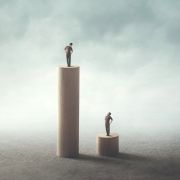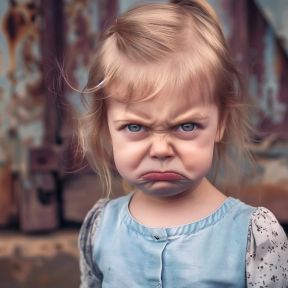
Social Comparison Theory
People constantly evaluate themselves, and others, in domains like attractiveness, wealth, intelligence, and success. According to some studies, as much as 10 percent of our thoughts involve comparisons of some kind. Social comparison theory is the idea that individuals determine their own social and personal worth based on how they stack up against others. The theory was developed in 1954 by psychologist Leon Festinger. Later research has shown that people who regularly compare themselves to others may find motivation to improve, but may also experience feelings of deep dissatisfaction, guilt, or remorse, and engage in destructive behaviors like lying or disordered eating.

When individuals compare themselves to others as a way of measuring their personal development or to motivate themselves to improve and, in the process, develop a more positive self-image, comparisons can be beneficial. It takes discipline, however, to avoid the pitfalls of negative comparison. In large part, how we react to comparisons depends on who we compare ourselves to: When we just want to feel better about ourselves, we tend to engage in comparisons to people worse off than we are, although this can become an unhealthy habit. When we want to improve, though, we may compare ourselves to people roughly similar to us but higher achieving in one trait or another.
Social comparison can be highly beneficial when people use social networks to push themselves. In a study, friendly competition was highly effective in pushing people to exercise more, as peers pushed each other to keep up and do more. In such a "social ratchet effect," each person’s activity generates more activity among others. Social networks in which people simply offered each other positive encouragement were far less helpful.
People generally engage in either upward or downward comparisons. In upward comparisons, we compare ourselves with those we believe are better than us in some way; in downward comparisons, we do the opposite. Research, unsurprisingly, finds that downward comparisons make us feel better about ourselves, but that there are dangers to each approach—insecurity and jealousy, or overconfidence and arrogance.
Envy is usually an unpleasant feeling that can lead to brooding, resentment, or even violence. Some psychologists, however, have suggested that people can experience “benign” envy, in which they use envious feelings as motivation to improve themselves. Benign envy could lead someone, for example, to try to emulate the best qualities of a person who has what they want.

Theodore Roosevelt called comparison “the thief of joy,” and he may have been right. Social comparison can motivate people to improve, but it can also promote judgmental, biased, and overly competitive or superior attitudes. Most people have the social skills and impulse control to keep their standards for social comparison to themselves, and not to act on any envy or resentment spurred by comparison-making. But their true feelings may manifest in other ways.
Comparisons are likelier to make us feel bad when we make the error of only comparing ourselves to paragons of certain traits. For example, many people believe they have a less active social life than others. But when making such comparisons, people tend to compare themselves only to the most social people they know. Understanding this bias can help us make more realistic and motivating comparisons.
Constantly checking social-media feeds full of images from parties, concerts, or other aspirational events can diminish self-esteem and contribute to depression. But some studies have found that such risks primarily affect those high in the trait of neuroticism, and others suggest that social-media use can reinforce self-esteem; for example, when people review their own images of good times with friends.
To be less vulnerable to painful comparisons, notice the people or events that prompt the behavior. Commit to being deeply grateful for what’s good in your own life. And remember that the human propensity to want what others have is such a waste of time, unless what you see and “covet” in another is something of deep worth, such as their generosity or kindness.

Many people fall into the trap of positional bias, comparing "up" more often than "down" relative to their own standing. A fascination with celebrity culture and the prevalence of carefully-manicured social-media feeds only exacerbates the effect by exposing people to an endless stream of others’ seemingly perfect images, homes, jobs, skills, and families.
It's been widely proven that people tend to believe that they are above average when it comes to desirable traits such as intelligence. But this the belief may not be so stable. For example, people are generally quick to report that they are smarter than average, but somewhat more humble when asked to place themselves in a specific percentile or to rate themselves on specific skills.
Two-thirds of Americans believe their intelligence is above average, but men are much more likely to inflate themselves than women; in surveys, more than 70 percent of men state that they are smarter than average, compared to about 60 percent of women, and they are much more likely to “strongly agree” that they are smarter than average.
Grandiosity is a core trait of many individuals high in narcissism. But seeing themselves as superior also requires seeing everyone else as beneath them. Research finds that while most people are driven by a need for social inclusion and approval, those high in narcissism are motivated by a need for status—to stand above a group, rather than being welcomed into it.














